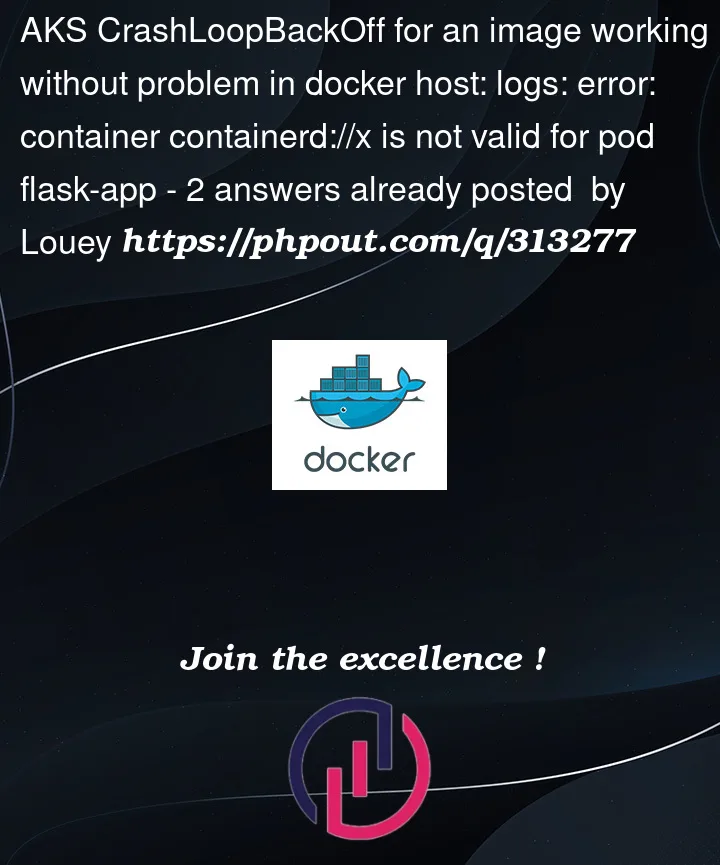I have a Flask app that should run on Apache2 server. I dockerized the app and it is working as expected on docker host in my test VM.
Once deployed on AKS the POD is stuck in state CrashLoopBackOff.
I am using a gitlab agent to deploy into AKS with gitlab-ci, the image is stored in gitlab private registry and the image was successifully pulled into AKS.
Here are the files/logs of my apps/AKS pod
Dockerfile
FROM debian:bullseye-slim
RUN apt-get update && apt-get install -y apache2
libapache2-mod-wsgi-py3
python3
python3-pip
&& apt-get clean
&& apt-get autoremove
&& python3 -m pip install flask
&& rm -rf /var/lib/apt/lists/*
COPY ./requirements.txt /var/www/webApp/requirements.txt
RUN pip install -r /var/www/webApp/requirements.txt
COPY ./webApp.conf /etc/apache2/sites-available/webApp.conf
COPY ./ /var/www/webApp/
RUN a2dissite 000-default.conf
RUN a2ensite webApp.conf
RUN ln -sf /proc/self/fd/1 /var/log/apache2/access.log &&
ln -sf /proc/self/fd/1 /var/log/apache2/error.log
EXPOSE 8080
WORKDIR /var/www/webApp
CMD /usr/sbin/apache2ctl -D FOREGROUND
Deployment
apiVersion: apps/v1
kind: Deployment
metadata:
labels:
app: flask-app
name: flask-app
spec:
replicas: 1
selector:
matchLabels:
app: flask-app
template:
metadata:
labels:
app: flask-app
spec:
containers:
- image: registry.gitlab.com/sast6353642/sast-01-pull/flask-appache:0a654662
name: flask-appache
ports:
- containerPort: 8080
#securityContext:
#privileged: false
imagePullPolicy: Always
#resources:
#limits:
#memory: 100Mi
#cpu: 300m
imagePullSecrets:
- name: gitlab
restartPolicy: Always
kubectl get pods
NAME READY STATUS RESTARTS AGE
flask-app-6d74447889-bghtx 0/1 CrashLoopBackOff 6 (2m27s ago) 8m18s
kubectl describe pods flask-app-6d74447889-bghtx
Name: flask-app-6d74447889-bghtx
Namespace: default
Priority: 0
Service Account: default
Node: aks-agentpool-16891536-vmss000000/10.224.0.5
Start Time: Tue, 02 Jan 2024 20:20:49 +0000
Labels: app=flask-app
pod-template-hash=6d74447889
Annotations: cni.projectcalico.org/containerID: 966c590b4ce639fa829feba8e597d63395af53ea231ab005f8d547e1721f8233
cni.projectcalico.org/podIP: 10.244.1.17/32
cni.projectcalico.org/podIPs: 10.244.1.17/32
Status: Running
IP: 10.244.1.17
IPs:
IP: 10.244.1.17
Controlled By: ReplicaSet/flask-app-6d74447889
Containers:
flask-appache:
Container ID: containerd://5cdc5e1294267fce47bda95cb81bd09654a78fcf21dfe4bbaece786d195ea778
Image: registry.gitlab.com/sast6353642/sast-01-pull/flask-appache:0a654662
Image ID: registry.gitlab.com/sast6353642/sast-01-pull/flask-appache@sha256:e798e4036dc13d72ef36c866d678fe295e3eac4b0058cd076330654bc56af317
Port: 8080/TCP
Host Port: 0/TCP
State: Waiting
Reason: CrashLoopBackOff
Last State: Terminated
Reason: Error
Exit Code: 1
Started: Tue, 02 Jan 2024 20:22:20 +0000
Finished: Tue, 02 Jan 2024 20:22:20 +0000
Ready: False
Restart Count: 4
Environment: <none>
Mounts:
/var/run/secrets/kubernetes.io/serviceaccount from kube-api-access-sj7s8 (ro)
Conditions:
Type Status
Initialized True
Ready False
ContainersReady False
PodScheduled True
Volumes:
kube-api-access-sj7s8:
Type: Projected (a volume that contains injected data from multiple sources)
TokenExpirationSeconds: 3607
ConfigMapName: kube-root-ca.crt
ConfigMapOptional: <nil>
DownwardAPI: true
QoS Class: BestEffort
Node-Selectors: <none>
Tolerations: node.kubernetes.io/not-ready:NoExecute op=Exists for 300s
node.kubernetes.io/unreachable:NoExecute op=Exists for 300s
Events:
Type Reason Age From Message
---- ------ ---- ---- -------
Normal Scheduled 2m57s default-scheduler Successfully assigned default/flask-app-6d74447889-bghtx to aks-agentpool-16891536-vmss000000
Normal Pulled 2m57s kubelet Successfully pulled image "registry.gitlab.com/sast6353642/sast-01-pull/flask-appache:0a654662" in 864.830288ms (864.838488ms including waiting)
Normal Pulled 2m55s kubelet Successfully pulled image "registry.gitlab.com/sast6353642/sast-01-pull/flask-appache:0a654662" in 827.635558ms (827.908837ms including waiting)
Normal Pulled 2m38s kubelet Successfully pulled image "registry.gitlab.com/sast6353642/sast-01-pull/flask-appache:0a654662" in 875.237209ms (875.244689ms including waiting)
Normal Created 2m10s (x4 over 2m57s) kubelet Created container flask-appache
Normal Started 2m10s (x4 over 2m56s) kubelet Started container flask-appache
Normal Pulled 2m10s kubelet Successfully pulled image "registry.gitlab.com/sast6353642/sast-01-pull/flask-appache:0a654662" in 827.338313ms (827.349353ms including waiting)
Warning BackOff 100s (x7 over 2m55s) kubelet Back-off restarting failed container flask-appache in pod flask-app-6d74447889-bghtx_default(1177ffe3-61ff-418f-a37d-3b6d857c603b)
Normal Pulling 88s (x5 over 2m57s) kubelet Pulling image "registry.gitlab.com/sast6353642/sast-01-pull/flask-appache:0a654662"
Normal Pulled 87s kubelet Successfully pulled image "registry.gitlab.com/sast6353642/sast-01-pull/flask-appache:0a654662" in 862.977469ms (862.990149ms including waiting)
kubectl logs flask-app-6d74447889-bghtx -c containerd://5cdc5e1294267fce47bda95cb81bd09654a78fcf21dfe4bbaece786d195ea778
error: container containerd://c4c557b4e6f92ac803c7e9c42624e59e39941e3d731015e12c4bea193dd5db3b is not valid for pod flask-app-6d74447889-bghtx
Logs in diagnostics settings in Azure
exec /usr/local/bin/python: exec format error
**app.py **
from website import create_app
app = create_app()
if __name__ == "__main__":
app.run(debug=True)
Can anyone help with that please ?
I tried making changes into the Dockerfile (changing the port exposed from 80 to 8080) but nothing happened. I searched from the log container not valid for pod and did not find anything related to that.
EDIT
My .gitlab-ci.yml
stages:
- build
- deploy
variables:
DOCKER_SOURCE_IMAGE: flask-appache:$CI_COMMIT_SHORT_SHA
DOCKER_TARGET_IMAGE: $CI_REGISTRY_TAG/$DOCKER_SOURCE_IMAGE
DOCKER_HOST: tcp://docker:2375/
DOCKER_DRIVER: overlay2
CI_REGISTRY_TAG: registry.gitlab.com/sast6353642/sast-01-pull
CI_REGISTRY: registry.gitlab.com
pull-push:
stage: build
image: docker:latest
services:
- docker:dind
before_script:
- docker login ${CI_REGISTRY} -u ${USERNAME_REGISTRY} -p ${TOKEN_REGISTRY}
script:
- docker build . -t ${DOCKER_SOURCE_IMAGE}
- docker tag ${DOCKER_SOURCE_IMAGE} ${DOCKER_TARGET_IMAGE}
- docker push ${DOCKER_TARGET_IMAGE}
- docker logout ${CI_REGISTRY}
deploy:
stage: deploy
image:
name: bitnami/kubectl:latest
entrypoint: ['']
script:
- kubectl config use-context k8s-flask/k8s-connection:k8s-agent-connection
- kubectl get pods
- kubectl apply -f .




2
Answers
I resolved the issue. The cpu architecture of node pools (ubuntu) in AKS is ARM, I had to specify FROM --platform=linux/arm in my Dockerfile so the base image would be based on ARM instead on AMD64 so it can work in an ARM based host.
Exemple: FROM --platform=linux/arm python:3.10-alpine
If the image is built in an Amd64 based host with the --platform=linux/arm prefix for base image in the Dockerfile this will not work => Qemu has to be installed so it can provide other system architecture platforms.
Before installing Qemu
Installing Qemu on Debian/Ubuntu
You can see ARM now in platforms
If you build the image using CI/CD as gitlab-ci you just need to specify the --platform=linux/arm in you Dockerfile Before the image name.
Hope this helps !
In order to run your dockized flask application on AKS, you can refer to below example.
Here I will be using a simple flask app that says This is a Hello World application using the below code. You can replace it with your own.
Then containerize the app using docker. In this case, Flask application only requires the
flaskframework to run. Therefore, in the working directory, I will create a new file named ‘Dockerfile’ and use the following code:and then build it using
docker build -t bravinwasike/flask-kubernetes .Output:

After creating the Docker image, ensure you push the Docker image into your Azure container repository using the following commands:
next we will deploy the containerized Flask application to the created AKS cluster

Create a deployment yaml file that refers to the image that I just pushed in my acr

Deployment and service yaml file combined
then apply the yaml
Done.. Now when you do

kubectl get podsyour pods are upYour flask app is up